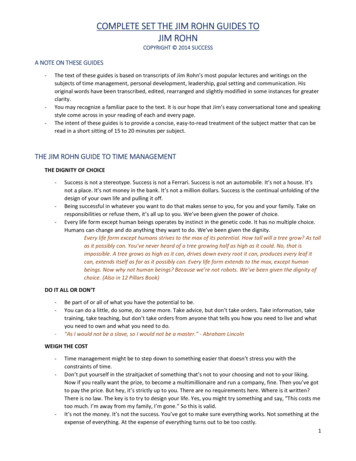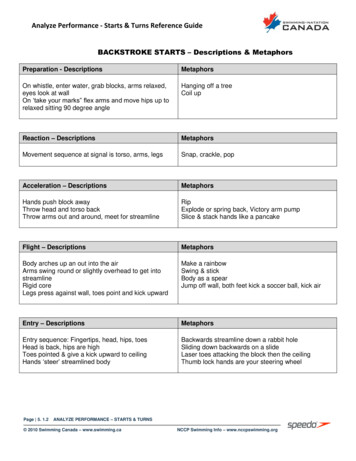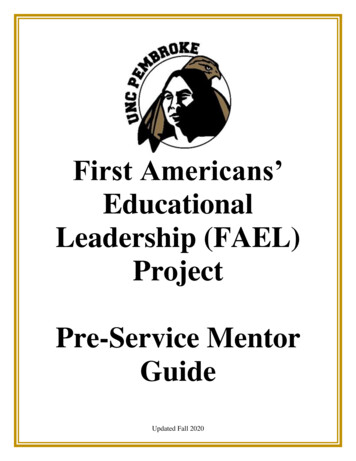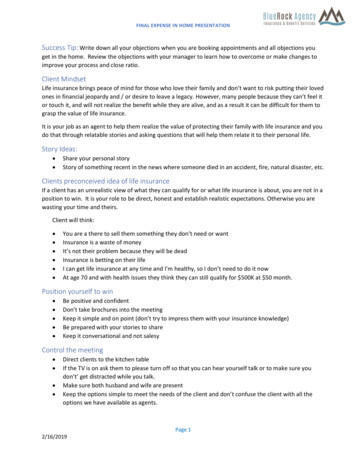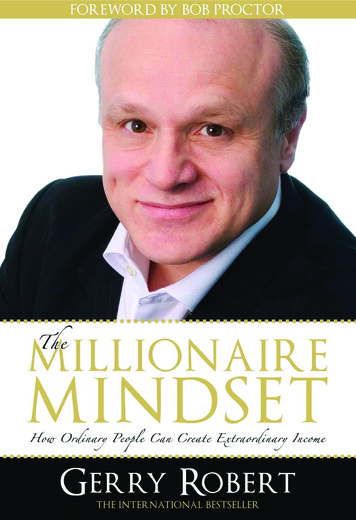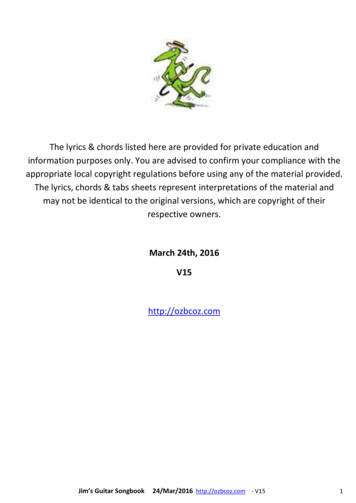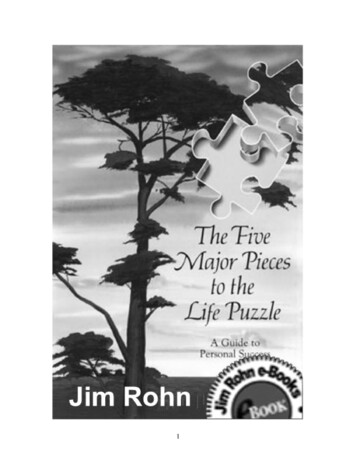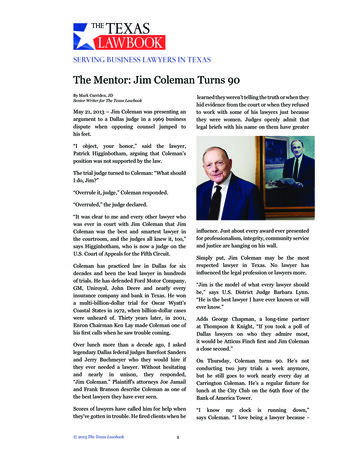
Transcription
SERVING BUSINESS LAWYERS IN TEXASThe Mentor: Jim Coleman Turns 90By Mark Curriden, JDSenior Writer for The Texas LawbookMay 21, 2013 – Jim Coleman was presenting anargument to a Dallas judge in a 1969 businessdispute when opposing counsel jumped tohis feet.learned they weren’t telling the truth or when theyhid evidence from the court or when they refusedto work with some of his lawyers just becausethey were women. Judges openly admit thatlegal briefs with his name on them have greater“I object, your honor,” said the lawyer,Patrick Higginbotham, arguing that Coleman’sposition was not supported by the law.The trial judge turned to Coleman: “What shouldI do, Jim?”“Overrule it, judge,” Coleman responded.“Overruled,” the judge declared.“It was clear to me and every other lawyer whowas ever in court with Jim Coleman that JimColeman was the best and smartest lawyer inthe courtroom, and the judges all knew it, too,”says Higginbotham, who is now a judge on theU.S. Court of Appeals for the Fifth Circuit.Coleman has practiced law in Dallas for sixdecades and been the lead lawyer in hundredsof trials. He has defended Ford Motor Company,GM, Uniroyal, John Deere and nearly everyinsurance company and bank in Texas. He wona multi-billion-dollar trial for Oscar Wyatt’sCoastal States in 1972, when billion-dollar caseswere unheard of. Thirty years later, in 2001,Enron Chairman Ken Lay made Coleman one ofhis first calls when he saw trouble coming.Over lunch more than a decade ago, I askedlegendary Dallas federal judges Barefoot Sandersand Jerry Buchmeyer who they would hire ifthey ever needed a lawyer. Without hesitatingand nearly in unison, they responded,“Jim Coleman.” Plaintiff’s attorneys Joe Jamailand Frank Branson describe Coleman as one ofthe best lawyers they have ever seen.Scores of lawyers have called him for help whenthey’ve gotten in trouble. He fired clients when he 2013 The Texas Lawbook1influence. Just about every award ever presentedfor professionalism, integrity, community serviceand justice are hanging on his wall.Simply put, Jim Coleman may be the mostrespected lawyer in Texas. No lawyer hasinfluenced the legal profession or lawyers more.“Jim is the model of what every lawyer shouldbe,” says U.S. District Judge Barbara Lynn.“He is the best lawyer I have ever known or willever know.”Adds George Chapman, a long-time partnerat Thompson & Knight, “If you took a poll ofDallas lawyers on who they admire most,it would be Atticus Finch first and Jim Colemana close second.”On Thursday, Coleman turns 90. He’s notconducting two jury trials a week anymore,but he still goes to work nearly every day atCarrington Coleman. He’s a regular fixture forlunch at the City Club on the 69th floor of theBank of America Tower.“I know my clock is running down,”says Coleman. “I love being a lawyer because
SERVING BUSINESS LAWYERS IN TEXASthe law is the most beautiful thing you can do.It is about helping people.”Coleman says the practice of law today “isn’tnearly as much fun or as gratifying” as when hestarted. Law firms, he says, operate too muchlike a business and too little like the great andnoble profession that he loves.“Today, it is mostly about winning and whogets the biggest fees, and that is sad,” he says.“But looking back, I wouldn’tchange a thing.”Child of the GreatDepressionJames E. Coleman, Jr. wasborn May 23, 1923. He wasin the first grade in Atlantawhen the stock marketcrashed. His father, who wasa real estate agent, refusedto file for bankruptcyprotection and instead usedhis entire personal savingsto pay his debts.“She quit the day the war ended, even thoughSinclair offered to double her salary if she stayed,”he says. “She loved being a mom and wife.”At 17, Coleman started thinking abouthis future. He considered being a doctor,a minister or a lawyer. But he read an articlein Good Housekeepingthat most parishionersweredissatisfiedwiththeir reverend.“So, I marked being aminister off the list,”he says.“People were jumping out of windows on WallStreet,” he says. “My dad did the right thing andwe lost everything.”The family lived in a small house that sometimeswent without electricity because they couldn’tafford it. One day in 1930, the family car startedsputtering as his mother drove it into the garage.The car didn’t move for several years becausethey didn’t have the money to get it fixed.“I had two mothers – my white mother andmy black mother, Bell Jones, who helped raiseme and I loved her very much,” says Coleman.“When I was 11, I had typhoid fever and BellJones never left my side the entire summer.She even slept in my room.”That same year, a neighborhood friend used then-word when talking about his second mom.Coleman immediately cold-cocked the kid,drawing complaints from the friend’s parents butsupport from his own mother and father. 2013 The Texas LawbookWhen World War II began, Coleman’s motherwent to work for Sinclair Oil because she wantedto do her patriotic duty.2Coleman enrolled as afreshmanengineeringstudent at Georgia Tech,where he met MargaretSutherland, whose father,William, was the foundingpartner of one of Atlanta’slargest and most influential law firms,Sutherland, Asbill & Brennan, which now hasoffices in Austin and Houston.College, War, Marriage & the CIAOn Dec. 7, 1941, Coleman was exiting a movietheater when he heard a newspaper boy with theAtlanta Constitution on the street corner screamout, “Extra, Extra. Japan Attacks Pearl Harbor.”A few weeks later, Coleman enlisted in the Army,where he served as a platoon leader and SecondLieutenant and marched through Europe withPatton’s Third Army and later received the SilverStar. At the end of the war, he was transferred toCamp Swift in Bastrop, Texas, where he serveduntil he was released from duty in 1946. It washis first brush with Texas and he loved it.With the G.I. Bill paying the way, Coleman wentback to Georgia Tech to finish college and getmarried, as he and Margaret had gotten serious.Ms. Coleman died last year. The couple had beentogether for more than 65 years.
SERVING BUSINESS LAWYERS IN TEXASFrom May 1951 to July 1953, Coleman worked forthe CIA. He refuses to discuss his work for thespy agency, but he makes it clear he was no meredesk clerk.“Even my wife never knew what I did,” he says.That summer, Coleman started looking for a job.His father-in-law made it clear he could moveback to Atlanta and join his law firm. But Colemanfelt he would always be “under Bill Sutherland’sshadow,” so he and Margaret moved to Texas.“Margaret was the love of my life and I miss hervery much,” he says.In an early test of integrity, Coleman’s chemistryclassmates approached him the night before thefinal exam. They had obtained a copy of the testand answers and invited him to review it withthem. Coleman declined and spent the nightstudying instead.“The next morning, I sat in class as the testwas being handed out and then I heard a gaspfrom my classmates,” he says. “The teacher hadlearned that some students had gotten the examand he had completely changed it.”Next stop: law school at the University ofVirginia. The happy couple dropped by the postoffice on their way to a college football game inCharlottesville in 1951 when Coleman received anofficial-looking letter. It was an order to report toFort Meade in Maryland to prepare to deploy toKorea immediately upon graduation.Following a basic physical, Coleman was givena street address in Washington, D.C. and wasordered to report the next day.“The taxi driver pulled up to the U.S. GovernmentPrinting Office,” says Coleman. “I started arguingwith the taxi driver that this couldn’t be thebuilding, but he insisted it was the right address.“I went inside and learned that it was really theCentral Intelligence Agency,” he says. 2013 The Texas Lawbook3Coleman Arrives in TexasPaul Carrington of Carrington, Gowan, Johnson& Walker, which, along with Thompson & Knight,was the largest law firm in Dallas with 18attorneys, offered Coleman a job as a lawyer inthe real estate contracts practice. The salary was 200 a month – not enough for he, his wife andtheir two children to live on. So, the couplestarted taking loans from Mercantile Bank just topay bills.Coleman quickly made friends with another ofthe firm’s rising young lawyers, Jack Hauer,who would later become a named partner atAkin Gump Strauss Hauer & Feld.“Jack and I loved doing trial work, so we would goaround the office every Friday asking everyone ifthey had a case going to trial on Monday that wecould handle for them,” he says. “Then, Jack andI would decide which one of us would examinethe lying insurance agent and which one wouldtackle the lying doctor.”Hauer and Coleman hung out at the courthousejust looking for opportunities. One day in 1954,they wandered into the Justice of the PeaceCourt in Oak Cliff, waiting for their client’scase to be called.The judge in that court described himself as“the Law West of the Trinity.”The first case on the docket that day featureda lawyer who was suing a day laborer who
SERVING BUSINESS LAWYERS IN TEXAScouldn’t afford to hire a lawyer over anunavoidable car accident. The plaintiff/lawyer sought 200 in damages – money theguy didn’t have.“If Coastal States had lost the trial, the companycould never have posted the appeals bond andthe company had already hired Baker Botts toprepare to file for bankruptcy,” he says.“Even though the evidence and the law was onthe non-lawyer’s side, the lawyer was clearlywinning,” says Coleman. “Jack and I leanedforward and asked the guy if he wanted two reallygood lawyers to defend him for free.Coleman essentially moved to San Antonio,staying in a hotel room on the river for more thana year. “I joined the YMCA and took out all mygrievances on the punching bag at the end of eachday,” he says.The man quickly agreed.A key moment during the trial came when theplaintiff’s star witness, the mayor of San Antonio,took the witness stand to testify against Coastal.“I stood up and said, ‘Judge, Jack Hauer andI have just been retained to represent thisdefendant in this matter,’” says Coleman.“We won the case for our client in 20 minutes.The lawyer on the other sidewas not happy.”A Billion Dollar TrialColeman’s first huge bet-thecompany case came in 1971.Coastal States Gas Company,which had been foundedby Oscar Wyatt, sold gas tocities such as San Antonio,Austin and Corpus Christi forabout a dime a gallon.Under a blistering cross-examination by Coleman,the mayor became confused, provided testimonythat conflicted with his ownearlier statements, refused toanswer some questions andclearly demonstrated a lack ofknowledge of the lemanCarrington Coleman advertisment congratulating Jimrepeatedly told the judge.“We had to prove that they had no cause of actionWhen OPEC cut production and raised prices byin Bexar County because we were doing business70 percent, Wyatt convinced the Texas Railroadthere. We slowly started seeing the judge moveCommission to allow Coastal to raise its rates.to our side.”San Antonio refused to pay and instead suedCoastal. Coastal countersued. Several billionLawyers for both sides noticed that the judgedollars in damages were at stake, which was realwas slowly changing his position in favor ofmoney 40 years ago.Coastal States, leading San Antonio officials toagree to settle the case on terms very favorable toWhen Coastal States and Wyatt hired Coleman,Coastal States.company officials told the newspapers that ifhe lost the case, the company would go out of“Back then, it never took a year or two for a casebusiness.to go to trial because the judges would push us totrial,” Coleman says. “There were several times“We were getting killed in the press, saying thiswhen I picked a jury in one case while I had a jurywas the worst issue to ever hit San Antonio –in another case down the hall deliberating theirworse than the Alamo,” says Coleman. “The judgeverdict. I waived a jury trial twice in my life anddown there treated us like a country dog comeboth times it was a mistake. to town.” 2013 The Texas Lawbook4
SERVING BUSINESS LAWYERS IN TEXAS“I got to where I was more comfortable at thecourthouse than I was in the office,” he says.Carrington Coleman senior counsel JohnMartin remembers the first case he ever triedwith Coleman. The pair was defending themanufacturer of air conditioning units. As part ofthe discovery process, the lawyers were allowedaccess to a small room where the plaintiffs’lawyers kept all their documents.“The room was a mess – papers were scatteredeverywhere in complete disorder,” recalls Martin.“We went through every document, organizingthem in a way that helped us better understandwhat was important about the case.“When we were finished,Jimmy shocks me bythrowing the papers allacross the room,” saysMartin. “I tried to stop himbecause this wasn’t thecalm, very ethical JimmyColeman I knew.”threatened to bankrupt all of them. To avoid sucha result, the companies and lead plaintiff lawyersreached a deal.But Coleman, according to Martin, had doubtsabout the legality of such a broad settlement.“Jimmy convinced the insurance companies,who were absolutely certain that the courts wouldapprove the settlement, to agree to pay 1.5 billionto those who were suffering from mesotheliomaeven if the federal courts eventually rejected theglobal deal,” says Martin.Coleman’s instincts were right. In 1999,the Supreme Court rejected the settlement,sending the litigation into chaos.“But thanks to Jimmy, the victims received atleast some money from the insurance companies,”says Martin.James “Blackie” Holmes, who has been a Texastrial lawyer for more than 50 years, says Coleman“isn’t one of those gotcha lawyers who employsRambo-like tactics” in court.“But then Jimmy explainedto me that the way we hadorganized the papers was work product andprivileged because it showed what documents wethought were important and thus revealed ourcase strategy and that he was simply returningthe evidence back to its original state,” he says.John MartinMartin, who handled civil rights cases in the 1960sin Alabama for the U.S. Justice Department, saysColeman was absolutely correct.Brilliant Insight in Asbestos SettlementMartin says he witnessed Coleman’s brillianceagain in the 1990s when the duo were appointedby a federal judge in East Texas to representa class of plaintiffs who were involved in themulti-billion-dollar global asbestos settlementknown as the Fiberboard Corp. case.Fiberboard and its insurance carriers, ContinentalCasualty and Pacific Indemnity, were facing tensof thousands of personal injury lawsuits that 2013 The Texas Lawbook5James “Blackie”Holmes“Jim is a great trial lawyerbecause he is so smart andbecause he has so muchintegrity, which judges andjuries automatically see,”says Holmes, a partnerat Burford and Ryburn.“To have Jim Colemanintroduce you to the judgesgave you instant credibilitywith those judges.”Standing Up for What’s RightJudge Lynn, who Coleman hired right out of SMULaw School in 1976 and eventually made thefirm’s first woman partner in 1983, says lawyersgained instant credibility with judges if you toldthem you worked for Coleman.In 1976, Lynn joined a lawsuit brought by theSMU Association of Women Law Studentsagainst a handful of Dallas law firms claiming
SERVING BUSINESS LAWYERS IN TEXASthe firms discriminated against them in theirsummer hiring programs because of their gender.The lawsuit was viewed as sensitive and highlypolitical at the time, with many lawyers decliningto take a stand. Lynn was one of the earlywitnesses in the case for the plaintiffs.“I heard she would be testifying, so I went by heroffice and asked if she would like me to go withher to court,” says Coleman.Lynn quickly said yes.“Jim walked into court with me that day andwalked me around the courtroom introducing meto every lawyer there, basically forcing them toshake hands with me,” Lynn recalls. “Jim sat onthe front row and when I was done, he stood up,put his arm around me andwalked out with me.”Coleman says he wassympathetic to the cause.“I took Barb that morningto meet the judge andI introduced her to theopposing counsel and rightU.S. District Judgein front of him, I said,Barbara Lynn‘Bob will treat you withgreat respect and dignity or I will tell his wife,’”Coleman says.Judge Lynn says Coleman’s support neverwavered and he always made decisions based ondoing the right thing.“We had a client who said he didn’t wantwomen working on his case,” Lynn says.“Jim looked at the client and said, ‘Then we don’twant your business.’”says Lynn. “The client demanded to speak withJim, but Jim completely supported me andmy position. He was willing to lose theclient rather than compromise his integrity.That is Jim Coleman.”No Mandatory Retirement or I’m LeavingIn 1986, Coleman was facing his 65thbirthday. He kept seeing many of his long-timelawyer friends across Texas being forced toleave their law firms because of mandatoryretirement policies.As his firm’s managing partner, Coleman calleda meeting of the partnership to discussmandatory retirement.“I want one of two things: an agreement that wehave no such policy or to be grandfathered in andto be exempt from it,” Coleman told the lawyers.“If those things don’t happen, I’m leaving to joinanother law firm.”John Martin immediately made a motionthat Carrington Coleman should never haveany kind of mandatory retirement policy.It passed unanimously.“Carrington Coleman would have been a firmof fools if they had forced Jim to retire,” saysJudge Lynn, who was a partner at the time.“Every lawyer in the firm knew that Jim Colemanwas the most valuable person there.”Bruce Collins, the firm’scurrent managing partner,says it “would have beencrazy” to ask Colemanto leave.Another time, Lynn, who was a youngassociate, was handling a matter for a major firmclient when she discovered the client waswithholding documents despite a court order toproduce them.“Jim is still very activeand we turn to himquite often for his adviceand insight into clientBruce Collinsand firm matters,” saysCollins. “Jim’s example and values are our firm’sguiding principles.”“I told the client that I would not representhim if he continued to hide the documents,”Prominent trial lawyer Bill Dawson, a partnerat Gibson, Dunn & Crutcher, says Coleman 2013 The Texas Lawbook6
SERVING BUSINESS LAWYERS IN TEXAS“discovered and mentored more great young triallawyers” than any other Texas lawyer.“When others (in a huge trial) were distraught,he was calm and composed,” says Dawson.“He had seen lots of combat in WWII. He won aSilver Star for valor. When the war was over, hepromised he would never allow any situation toupset him so long as no one was being shot at.”Dawson says he once argued with Colemanthat handguns should be outlawed because“you couldn’t hit anything with them youintended to hit, and they were just accidentswaiting to happen.”Coleman listened to Dawson make his case andthen he responded.“Well, that is not my experience,” Coleman toldDawson. “When I was a Lieutenant in Patton’sarmy, walking across Germany, I picked up a.45 off a dead American and carried it the restof the war. One day, one of my men came up tome and said German soldiers were holed up in afarmhouse down the road.”Coleman kicked in the door and found the housewas full of German soldiers.“They were pretty much ready to surrender,except for one guy,” Coleman told Dawson.“I guess he felt duty bound to put up a fight.That .45 spun him like a top.”Dawson says he immediately “threw in the towel”and conceded the argument to Coleman.Dawson and other lawyers believe that Colemanwas the first lawyer in Texas to defend a legalmalpractice case back before law firms hadmalpractice insurance.The managing partner at the firm being suedcalled Coleman and asked if he would defendthem. Coleman agreed.“Jim tried the case and won it,” says Dawson.“The law firm thanked him. It n
legendary Dallas federal judges Barefoot Sanders and Jerry Buchmeyer who they would hire if they ever needed a lawyer. Without hesitating and nearly in unison, they responded, “Jim Coleman.” Plaintiff’s attorneys Joe Jamail and
